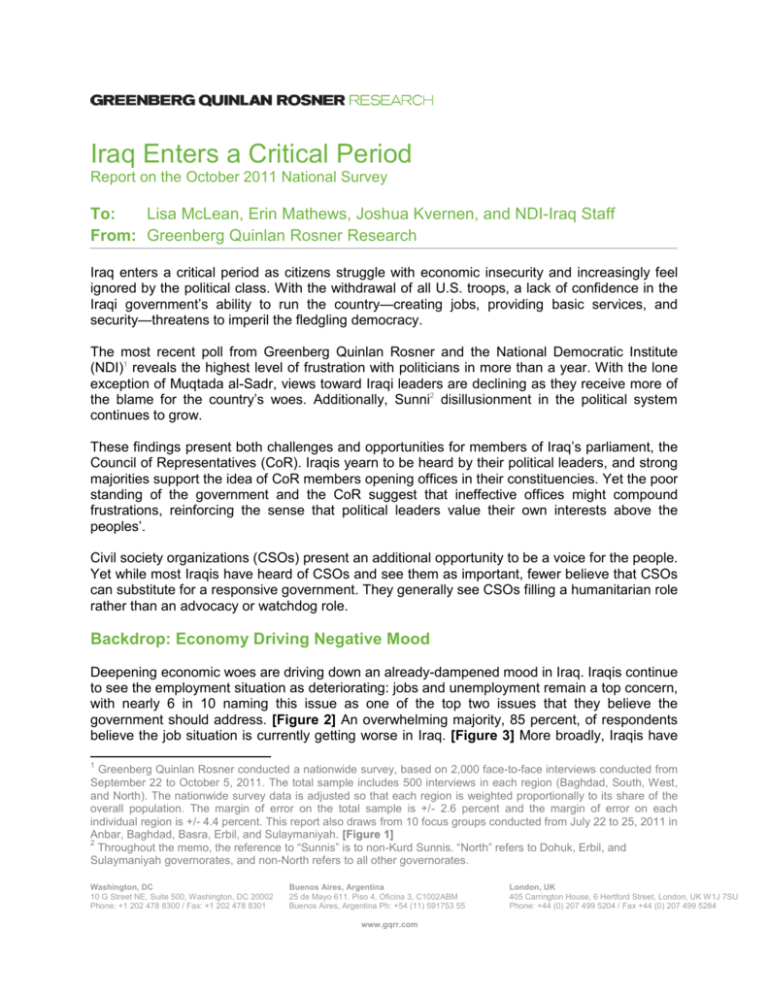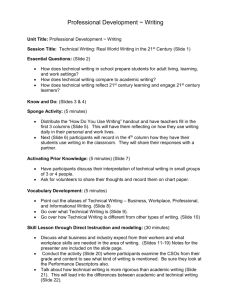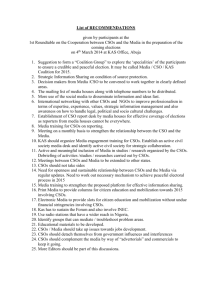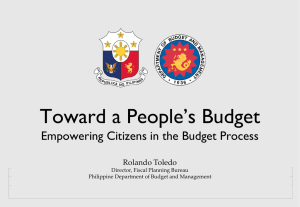
Iraq Enters a Critical Period
Report on the October 2011 National Survey
To:
Lisa McLean, Erin Mathews, Joshua Kvernen, and NDI-Iraq Staff
From: Greenberg Quinlan Rosner Research
Iraq enters a critical period as citizens struggle with economic insecurity and increasingly feel
ignored by the political class. With the withdrawal of all U.S. troops, a lack of confidence in the
Iraqi government’s ability to run the country—creating jobs, providing basic services, and
security—threatens to imperil the fledgling democracy.
The most recent poll from Greenberg Quinlan Rosner and the National Democratic Institute
(NDI)1 reveals the highest level of frustration with politicians in more than a year. With the lone
exception of Muqtada al-Sadr, views toward Iraqi leaders are declining as they receive more of
the blame for the country’s woes. Additionally, Sunni2 disillusionment in the political system
continues to grow.
These findings present both challenges and opportunities for members of Iraq’s parliament, the
Council of Representatives (CoR). Iraqis yearn to be heard by their political leaders, and strong
majorities support the idea of CoR members opening offices in their constituencies. Yet the poor
standing of the government and the CoR suggest that ineffective offices might compound
frustrations, reinforcing the sense that political leaders value their own interests above the
peoples’.
Civil society organizations (CSOs) present an additional opportunity to be a voice for the people.
Yet while most Iraqis have heard of CSOs and see them as important, fewer believe that CSOs
can substitute for a responsive government. They generally see CSOs filling a humanitarian role
rather than an advocacy or watchdog role.
Backdrop: Economy Driving Negative Mood
Deepening economic woes are driving down an already-dampened mood in Iraq. Iraqis continue
to see the employment situation as deteriorating: jobs and unemployment remain a top concern,
with nearly 6 in 10 naming this issue as one of the top two issues that they believe the
government should address. [Figure 2] An overwhelming majority, 85 percent, of respondents
believe the job situation is currently getting worse in Iraq. [Figure 3] More broadly, Iraqis have
1
Greenberg Quinlan Rosner conducted a nationwide survey, based on 2,000 face-to-face interviews conducted from
September 22 to October 5, 2011. The total sample includes 500 interviews in each region (Baghdad, South, West,
and North). The nationwide survey data is adjusted so that each region is weighted proportionally to its share of the
overall population. The margin of error on the total sample is +/- 2.6 percent and the margin of error on each
individual region is +/- 4.4 percent. This report also draws from 10 focus groups conducted from July 22 to 25, 2011 in
Anbar, Baghdad, Basra, Erbil, and Sulaymaniyah. [Figure 1]
2
Throughout the memo, the reference to “Sunnis” is to non-Kurd Sunnis. “North” refers to Dohuk, Erbil, and
Sulaymaniyah governorates, and non-North refers to all other governorates.
Washington, DC
10 G Street NE, Suite 500, Washington, DC 20002
Phone: +1 202 478 8300 / Fax: +1 202 478 8301
Buenos Aires, Argentina
25 de Mayo 611. Piso 4, Oficina 3, C1002ABM
Buenos Aires, Argentina Ph: +54 (11) 591753 55
www.gqrr.com
London, UK
405 Carrington House, 6 Hertford Street, London, UK W1J 7SU
Phone: +44 (0) 207 499 5204 / Fax +44 (0) 207 499 5284
Iraq Enters a Critical Period: Report on the October 2011 National Survey
2
little faith in their economy—nearly half, 49 percent, characterize the Iraqi economy as weak.
This opinion varies regionally with slightly more confidence in Baghdad and the South (32 and
39 percent weak, respectively), to 77 percent in the West saying the Iraqi economy is weak.
[Figure 4]
With confidence in the economy waning, only 37 percent of Iraqis think the country is heading in
the right direction—a low point since Greenberg Quinlan Rosner began polling more than a year
ago and down 4 points since July. [Figure 5] The mood is slightly better in Baghdad, where a
49 percent plurality think the country is heading in the right direction, and more sharply negative
in the West, where the figure is only 16 percent. [Figure 6]
Although concern about unemployment dominates in every region, there are regional
differences on other issues. Corruption is a major issue in the North and West, while basic
services are a top concern in the South. More than one-third of Iraqis name the provision of
services like electricity and water as a top concern; in the South, this figure jumps to 70 percent.
[Figure 7] Even more starkly, 93 percent of Iraqis in the South say that electricity service is
getting worse. [Figure 8]
With deteriorating conditions fueling public discontent, Iraq enters a critical period for three key
reasons:
1. The standing of most of the major political leaders and parties continues to
deteriorate as citizens blame them for Iraq’s worsening conditions and lack of
responsiveness.
2. Muqtada al-Sadr reaps the benefits from weakened opponents as his support
among young men, urban, and poorer Iraqis gives him a base with mobilization
potential.
3. Sunni disillusionment continues as their confidence in the political system and
leaders representing their own sect wanes.
1. The standing of most of the major political leaders and parties continues to deteriorate
as citizens blame them for Iraq’s worsening conditions and lack of responsiveness. As
conditions worsen, more Iraqis are placing blame on their leaders for the poor economic
situation and the lack of services. Focus groups reveal a strong sense that politicians are the
root of Iraq’s problems. A Shiite man from Basra says, “Definitely the government is responsible
for the bad situation. The puzzling thing is that the situation is getting worse, it is as if we are
going backwards.”
As a result, nearly all national politicians see their favorability ratings fall from July, some
sharply. [Figure 9] Sunni-aligned leaders, in particular, see a stronger drop: Ayad Allawi’s
favorability drops 8 points, Iraqi Vice President Tareq al-Hashemi falls 7 points, and CoR
Speaker Osama al-Nujaifi falls 9 points. All other national leaders, with the exception of Sadr,
see their overall ratings fall.
For many politicians, the drop in favorable ratings largely comes from their base supporters. For
example, Allawi’s favorability rating falls 8 points nationally, but among those who identify most
closely with Iraqi National Accord (INA), it falls by 11 points. [Figure 10] Even more pronounced
is his fall among Sunnis—a 16-point drop from 84 percent favorable in July to 68 percent now.
2011 Greenberg Quinlan Rosner, All Rights Reserved.
Iraq Enters a Critical Period: Report on the October 2011 National Survey
3
Allawi’s job approval rating also falls: a majority now disapprove of the job he is doing, and only
38 percent approve, down 8 points since July. [Figure 11] Many see Allawi as solely focused on
his own power and politics. “He does nothing but oppose and object—with no action,” says a
Sunni woman from Anbar. This perception is reinforced by Allawi’s public arguments with Prime
Minister Nouri al-Maliki and his vacillating stands on the proposed National Council for Strategic
Policies.
Nujaifi remains weakened after losing the strong base of support he had in 2010. Only 33
percent approve of the job he is doing as Speaker of the CoR—15 points lower than his
standing in November 2010. [Figure 12] And his favorability continues to fall, now at only 17
percent favorable. [Figure 13] He is stronger in the West (33 percent favorable) and among
Sunnis (41 percent favorable), though down among these groups as well.
Maliki is not immune either. Fewer than one third give him a favorable rating, and a 58-percent
majority disapproves of the job he is doing as prime minister. [Figures 14 and 15] While Maliki
still has his highest rating in the South (45 percent favorable), it is also where he sees the
biggest drop, down from 55 percent in July. [Figure 16] As with many other leaders, there is
notable weakness in Maliki’s base. Among those who identify most closely with Da’wa over
other parties, Maliki’s favorable rating falls 7 points. [Figure 17]
Driving the diminishing support for Iraq’s leaders is a strong sense that the political class is
simply not responsive to the needs of its citizens. Vast majorities feel that “the central
government’s responsiveness to the people’s needs” has gotten worse—67 percent nationally.
[Figure 18] The figure is even higher in the West, at 74 percent.
Members of parliament (MPs) in the CoR, in particular, are seen as unaware and unresponsive.
A full 55 percent of Iraqis believe that MPs from their governorate are unaware of local
conditions in their neighborhood, and an even higher 64 percent think that MPs from their
governorate are mostly unresponsive to the needs of their neighborhood. [Figure 19]
The ratings of political parties reflect the popular view of their leaders. INA’s favorability falls 10
points since July to only 23 percent favorable and plummets 19 points among Sunnis. [Figure
20] The party sees the largest drop in support: in a hypothetical parliamentary election, only 14
percent of Iraqis would vote for INA, down 7 points from July. [Figure 21] Da’wa support also
drops to 16 percent from 18 percent in July. Additionally, 16 percent of Iraqis say they would not
vote at all, and 13 percent are undecided. In the West, INA retains its lead over Da’wa, with
support for the Iraqi Front for National Dialogue (IFND) growing to 17 percent. [Figure 22]
These broad losses indicate Iraqis are looking for change. In fact, a 53 percent majority of Iraqis
want to go in a different direction than Maliki is taking the country, including 49 percent of
undecided voters. [Figure 23] Voters largely blame Maliki and the government for the country’s
economic woes, rather than external factors such as international economic conditions or the
influence of other countries. Half of Iraqis believe that government ministers are to blame for the
current unemployment situation, followed closely by Maliki at 49 percent. [Figure 24] These
results suggest that continuing economic problems will take a toll on the standing of Maliki and
other government leaders.
2. Muqtada al-Sadr reaps the benefits from weakened opponents as his support among
young men, urban, and poorer Iraqis gives him a base with mobilization potential. Sadr
benefits from the failure of the political class to address Iraqis’ concerns. He is the only leader
2011 Greenberg Quinlan Rosner, All Rights Reserved.
Iraq Enters a Critical Period: Report on the October 2011 National Survey
4
whose image has not fallen since July—his favorability is steady (up 1 point to 36 percent),
giving him the highest favorability rating of major political figures. Significantly, his unfavorable
rating drops 7 points to 42 percent. [Figure 25]
More notable than Sadr’s overall standing, however, is his image among strategic demographic
groups. Sadr’s support is not only growing, but it is growing among critical demographic
groups—young, male, down-scale, and urban—that are particularly primed for mobilization.
Sadr’s favorable rating among young men outside of the North rises by 6 points since July to 47
percent favorable—making him more popular than any other national political leader among that
population (8 points higher than Maliki). [Figure 26] Among those who self-identify as being
from the poorer class in the non-North (27 percent of the sample), 52 percent feel favorable
toward Sadr—compared to only 35 percent toward Maliki. [Figure 27] Sadr’s favorability ratings
are also 12 points higher among non-North urban residents compared to rural residents.
[Figure 28]
Sadr Trend has the most support in a hypothetical parliamentary vote among the poorer class in
the non-North. [Figure 29] Additionally, Sadr Trend performs its best in the South, where it
garners 18 percent of the vote share, coming in second after Da’wa. In Baghdad, Sadr Trend
comes in third with 13 percent. [Figure 30]
3. Sunni disillusionment continues as their confidence in the political system and leaders
representing their sect wanes. The climate among non-Kurd Sunnis reaches new lows since
July. While 48 and 44 percent, respectively, of Kurds and Shia think Iraq is headed in the right
direction, only 11 percent of Sunnis think things are moving in the right direction, which
represents a 13-point fall in only a few months. [Figure 31]
Sunnis are also much more pessimistic about their economic situation. While 49 percent of
Kurds and 42 percent of Shia see their personal economic situation improving over the next
year, only 16 percent of Sunnis think they will see an improvement. [Figure 32] Further, while
52 percent of all Iraqis are optimistic about the future of their country, only 34 percent of Sunnis
feel the same. [Figure 33]
Compounding the lack of optimism is a real and growing sense of insecurity among Sunnis. A
full 45 percent of Sunnis choose security as one of the top two issues the government needs to
address, the highest mark over the last year. [Figure 34]
Additionally, more Sunnis than Shia or Kurds believe that their sect is mistreated by both society
and the government. Majorities of Shia and Kurds believe that society treats their sect fairly, but
60 percent of Sunnis believe that society treats their sect unfairly. And, tellingly, a full 75 percent
of Sunnis also believe that the government treats them unfairly. [Figure 35]
Rooted in this sense that Sunnis are mistreated is a diminishing belief that Iraq is a real
democracy. Among all Iraqis, 43 percent believe that their country is a real democracy;
however, among Sunnis, only 16 percent believe the same. [Figure 36] Even more worrisome,
only 35 percent of Sunnis are likely to vote in the next elections. [Figure 37]
This increasingly negative environment for Sunnis helps to explain why Sunni-aligned
politicians, such as Allawi and Nujaifi, see such dramatic decreases in their favorability ratings.
As the situation becomes more and more desperate for Sunnis, they are losing confidence in
their leaders and their ability to bring change.
2011 Greenberg Quinlan Rosner, All Rights Reserved.
Iraq Enters a Critical Period: Report on the October 2011 National Survey
5
Conditions Remain Stronger in the North
Kurdish Iraqis continue to feel more positively about their part of the country and, unlike their
counterparts to the south, they have not turned against their regional government. More than
three-quarters of the North thinks Kurdistan is heading in the right direction—4 points higher
than in July. [Figure 38] Majorities in the North think that electricity supply and security are
getting better—but majorities also think that sectarianism, corruption, and job opportunities are
getting worse. [Figure 39] Consequently, jobs and corruption are the two issues that Northern
Iraqis are most looking for the government to address. [Figure 40]
Unlike the rest of the country, Kurdish Iraqis are not turning against their leaders; in fact, many
are increasing their support. Kurdistan Regional Government (KRG) President Massoud
Barzani’s favorability rating jumps 8 points to 61 percent favorable in the North. [Figure 41] He
has been able to expand his support, particularly among those who most closely identify with
the Patriotic Union of Kurdistan (PUK). In July, 34 percent of those who identify with the PUK
gave him a favorable rating, now a full 65 percent give Barzani a favorable rating. [Figure 42]
Accordingly, the Kurdistan Democratic Party (KDP) maintains its lead in a hypothetical
parliamentary election, with 36 percent of the vote in the North. The PUK falls slightly to 28
percent. Goran sees a large drop, from 14 percent in July to 5 percent now. [Figure 43] Goran’s
favorable ratings are stable at 21 percent in the North, and party leader Nawshirwan Mustafa’s
rating rises 2 points to 26 percent favorable. [Figure 44] Yet Goran loses much of its base
support among youth; its vote share falls 12 points among those under 35 years old. [Figure
45]
While PUK’s vote slightly decreases, its favorability rating rises 3 points to 47 percent. [Figure
46] Iraqi national President and PUK leader Jalal Talabani’s favorable rating, however, takes a
sharp fall, down 14 points to 49 percent favorable. [Figure 47] Still the PUK sees relatively high
favorable ratings from KDP voters, suggesting there may be growth potential among its
opponents’ supporters. Among those currently voting for the KDP, 60 percent give the PUK a
favorable rating. [Figure 48]
An Opportunity for Constituency Offices
Given perceptions that their elected officials are unresponsive and unaware of the concerns of
the people, Iraqis show significant openness to the idea of constituency offices throughout the
country. Although there are some reservations about the potential effectiveness of these offices,
there are specific ways to talk about the offices that assuage doubts and attract the most
support.
Few Iraqis currently hear from their members of the CoR. Only 29 percent of Iraqis say they
hear news about their MP very often or occasionally—a figure that is lower in Baghdad and the
West (25 and 27 percent, respectively). [Figure 49] Still even fewer hear directly from an MP;
only 18 percent have ever had contact with a CoR MP, either face-to-face or through some
other form of contact. The figure is lower in the West and South, where only 11 and 15 percent
respectively have had contact with a member of the CoR. [Figure 50]
Despite negative attitudes toward their government, Iraqis want more contact with their MPs.
Strong majorities report that actions such as opening a constituency office, going on a listening
tour, and holding question-and-answer sessions would make them feel more favorable towards
2011 Greenberg Quinlan Rosner, All Rights Reserved.
Iraq Enters a Critical Period: Report on the October 2011 National Survey
6
their MPs. [Figure 51] Accordingly, 86 percent say they support the creation of constituency
offices. [Figure 52] This openness to local offices transcends the negative mood in the country,
particularly in the West where 89 percent support these offices. It also translates into a
willingness to visit these constituency offices. A 57-percent majority say they are very or
somewhat likely to visit a constituency office in their area. [Figure 53]
Iraqis look to these offices as a place to discuss the concerns and problems they are facing, and
so their preferred topics of discussion mirror the issues they want government to address. A full
64 percent of people would discuss jobs as one of their top two items, and 50 percent would
discuss services like electricity or water. [Figure 54] These findings place MPs in a difficult
position with their constituents because being able to provide a job or immediately improve a
public service will be difficult. MPs and their staff need to understand the issues that Iraqis will
want to discuss and need to be able to react appropriately and address these concerns. Aware
that jobs will be a common topic, MPs will need to think outside the box in addressing these
issues by, perhaps, using the offices as a resource center to find job openings or training
programs.
Nonetheless, the mere creation of these offices does not convince voters that their MPs will
address their concerns. Only 38 percent of Iraqis have a lot or some confidence that their
member could help them with the issue they bring to the office. And strong majorities outside
the North have a little or no confidence at all. [Figure 55]
There are a variety of reasons why Iraqis have doubts. Focus group participants express a
worry that the constituency offices would be hard to access—both physically and
psychologically. A third of Iraqis think that offices would be too difficult to get to, followed by 31
percent who think that they would only talk to an assistant, not an MP. [Figure 56] It will be
crucial for MPs and their staff to ensure that offices are both accessible—centrally located,
clearly marked, and inviting—and that the member is available. There is a real danger that
these offices could backfire by failing to provide the access to the MPs that Iraqis expect.
Accordingly, it is important for MPs to explain what these offices are; specifically, that their aim
is to bring the CoR closer to citizens and commit to listening to Iraqis’ concerns. [Figure 57] The
strongest messages that instill confidence in the constituency offices revolve around them being
places that Iraqis can voice their concerns and be listened to:
Closer to people: How can politicians all the way in Baghdad help average Iraqis? I
believe that members must be representatives of the people. Instead of staying in
Baghdad, I will spend half my time in local offices so I can be closer to the people and
understand their concerns.
Listen to concerns: The only way to understand people’s concerns is to listen to their
concerns. That’s why I am opening offices in my region—so I can listen firsthand to the
problems that my constituents have and then will do my best to solve them.
Iraqis Aware of CSOs; Views Improve with More Information
CSOs have an opportunity to fill the voids left by an unresponsive government. Nearly eight in
ten Iraqis are familiar with CSOs, with higher awareness in the West (89 percent) and lower in
the North (59 percent). [Figure 58] However, only 22 percent have a favorable view of CSOs,
with 17 percent remaining neutral. [Figure 59]
2011 Greenberg Quinlan Rosner, All Rights Reserved.
Iraq Enters a Critical Period: Report on the October 2011 National Survey
7
A majority of Iraqis (51 percent) believe CSOs play an important role in Iraqi society when given
a definition of their role.3 [Figure 60] The degree to which Iraqis see CSOs as important is
closely linked to their awareness of CSOs. Among those who have heard a lot about CSOs, 88
percent believe they are very or somewhat important; among those who have heard little or
nothing about CSOs, only 25 percent say they are important. [Figure 61]
One of the obstacles that CSOs face is the perception that they only focus on humanitarian
issues. Nearly half (49 percent) of Iraqis see providing humanitarian assistance as one of the
main roles of CSOs. Fewer view CSOs as playing an advocacy role, only 29 percent see CSOs
as monitoring the government, and just 17 percent say CSOs help the government understand
the public’s needs. [Figure 62] Forty-nine percent also say that CSOs are “only useful for
humanitarian issues”—including 56 percent in the South and 55 percent in the North. [Figure
63]
Accordingly, half of all Iraqis say CSOs have had no real impact on their lives. [Figure 64] Part
of the problem is that CSOs are not currently seen as an effective means for communicating to
the government. On a list of best ways to communicate needs to elected officials, utilizing CSOs
comes sixth, behind other civic actions such as protesting, voting, and communicating directly
with legislators and government officials. [Figure 65]
Along these lines, many Iraqis do not see CSOs as responsive; only 35 percent say CSOs are
very or somewhat responsive to the needs and concerns of their neighborhood. [Figure 66]
However, among those who have heard a great deal about CSOs, a strong 85 percent majority
see CSOs as responsive.
There are three key steps CSOs can take to increase their visibility and perceived importance in
Iraqi society:
1. Tap into Iraqis’ frustration with an unresponsive government
Iraqis are increasingly frustrated and are blaming their government and political leaders for
failing to address their needs. As Iraqis discount the government’s ability to represent them,
there is an opening for other bodies—such as CSOs—to play a larger role. CSOs need to
harness this frustration and demonstrate that they can help improve the government’s
responsiveness, or at a minimum, address Iraqis’ needs that are being neglected by the
government. The current environment is ripe for CSOs to position themselves as a means to
communicate the public’s concerns to their government.
2. Maintain independence from political parties
In the current environment, most politicians are near-toxic. There is an opening for CSOs to
position themselves as different and independent from most politicians and political parties.
CSOs that are closely linked with a political party are more likely to be viewed unfavorably.
3
Iraqis were asked if they thought CSOs play an important role after hearing the following information: “Some civil
society organizations, or CSOs, advocate on your behalf on issues such as human rights, women’s rights, youth,
family affairs, or provide humanitarian assistance. How important do you think these CSO efforts are in Iraq—very
important, somewhat important, just a little important, or not important at all?”
2011 Greenberg Quinlan Rosner, All Rights Reserved.
Iraq Enters a Critical Period: Report on the October 2011 National Survey
8
A majority of Iraqis—56 percent—believe that CSOs should be independent from political
parties. This desire is strongest in the West and South, where 63 and 64 percent, respectively,
want to see CSOs independent. [Figure 67] Yet one in five Iraqis (32 percent in the North) think
that CSOs are affiliated with political parties. This finding presents a problem, as 42 percent of
non-North Iraqis and 45 percent in the North believe that a CSO affiliated with a political party is
less capable of serving their needs, and a similar share believe that politically-affiliated CSOs
are less capable of influencing the government. [Figure 68]
Additionally, Iraqis do not think CSOs should get their funding from political parties. A plurality
(42 percent) believes that international organizations should be a source of funding for CSOs in
Iraq, more so than the federal government, local provincial councils, or Iraqi businesses.
[Figure 69] Nonetheless, CSOs will need to be careful about being perceived as an arm
through which international actors can influence Iraqis.
3. Develop communication strategies to articulate the work CSOs do in Iraq
The more Iraqis are exposed to CSOs, the more willing they are to see them move beyond
playing a humanitarian role and into an advocacy role, further demonstrating the need for
communications planning. Most Iraqis, 61 percent, hear about CSOs through the media, and 27
percent hear about them through advertisements, suggesting a strong need for media
strategies. [Figure 70] This strategy can be complemented with local events that Iraqis trust for
information. A majority (53 percent) name the media as one of their top-two trusted sources, but
Iraqis also look to public meetings and meetings at their mosques and churches. [Figure 71]
2011 Greenberg Quinlan Rosner, All Rights Reserved.








